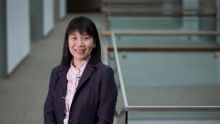
Assistant Professor Yasmin Ortiga of the SMU School of Social Sciences was recently awarded the National Academy of Education/Spencer Postdoctoral Fellowship 2019 for her research on higher education in the Philippines.
The world is your oyster. This old saying rings especially true today for anyone looking for quality education in today’s globalised, interconnected world. Students now have access to thousands of universities around the globe, and the plethora of courses they offer.
A 2017 study by UNESCO found that there were over 5.3 million tertiary-level (or higher) international students worldwide, up from 2 million in 2000. Over half of these students were enrolled in educational institutions in the US, UK, Australia, France, Germany, and Russia.
But that’s not the whole story. While examining higher education in the Philippines as part of her doctoral dissertation project, Yasmin Ortiga noticed that her home country of the Philippines was seeing a growing number of international students enrol in its universities over the last few years.
“On the surface, it didn't make sense — our universities are not highly ranked, and we are generally known as a country that sends out our people as migrants; we rarely receive them,” recalls the Assistant Professor of Sociology at SMU’s School of Social Sciences.
Intrigued by this phenomenon, she submitted a proposal for studying it. That proposal won her the 2019 National Academy of Education (NAEd)/Spencer Postdoctoral Fellowship, which was established in 1986 by the NAEd with a grant from the Spencer Foundation. It supports early career scholars making significant contributions to the field of education research, and comes with a $70,000 stipend plus three Professional Development retreats led by senior education scholars.
Illuminating preliminary findings
Assistant Professor Ortiga’s study is titled “Unlikely Faces in Unlikely Places: International Student Mobility and the Rise of the ‘Third World’ Education Hub”. She began fieldwork in the Philippines this August, and even during this early stage has found herself fascinated by her preliminary findings.
“When you talk about student mobility, people tend to think about wealthy East Asian students going to places like the US and Europe. In seeking the perspectives of those who had gone to ‘unlikely’ places like the Philippines, we start to realise that the ‘globalisation’ of higher education is much more diverse than we assume it to be,” explains the assistant professor.
Many students and families have been exploring overseas options in order to get around educational barriers or limitations within their home countries, and universities in the Philippines have been seeing an influx of students from India, Iran, and the US. “These students enter low-tier, for-profit universities offering degrees for professions where Filipino migrant workers are highly represented (e.g. nursing), often with the promise of also finding work in a global migrant labour market,” she writes in her project abstract.
She has been interviewing students and faculty members, and sitting in during lectures and laboratory classes. “At 5pm, I go home and spend the rest of the evening writing field notes,” she shares. By the time she finishes gathering data – hopefully by the end of 2020 – she hopes to be able to “map out a more inclusive view of higher education, especially in the Global South”.
Making meaningful impact on international education
Aside from the academic aspects of the study, she also wants to develop practical ways for educational institutions in the Philippines to help foreign students integrate into their universities and feel a sense of belonging. It’s her hope that prospective international students can benefit from a clearer picture of life in universities that are located outside of more typical destinations such as Australia or the UK.
She says: “We are not a country used to receiving foreigners, and while Filipinos are often stereotyped as being friendly and open to everyone, many of the foreign students I interviewed had actually complained about what they felt were racist reactions from local faculty and students.”
Next year, she plans to offer an SMU-XO course where teams of SMU students will have the opportunity to work with universities in the Philippines on ways to manage internationally diverse student populations. Says Assistant Professor Ortiga: “Given that Singaporean students grow up in a multiracial country, it will be interesting to see how SMU students bring their own perspectives to this problem.”



